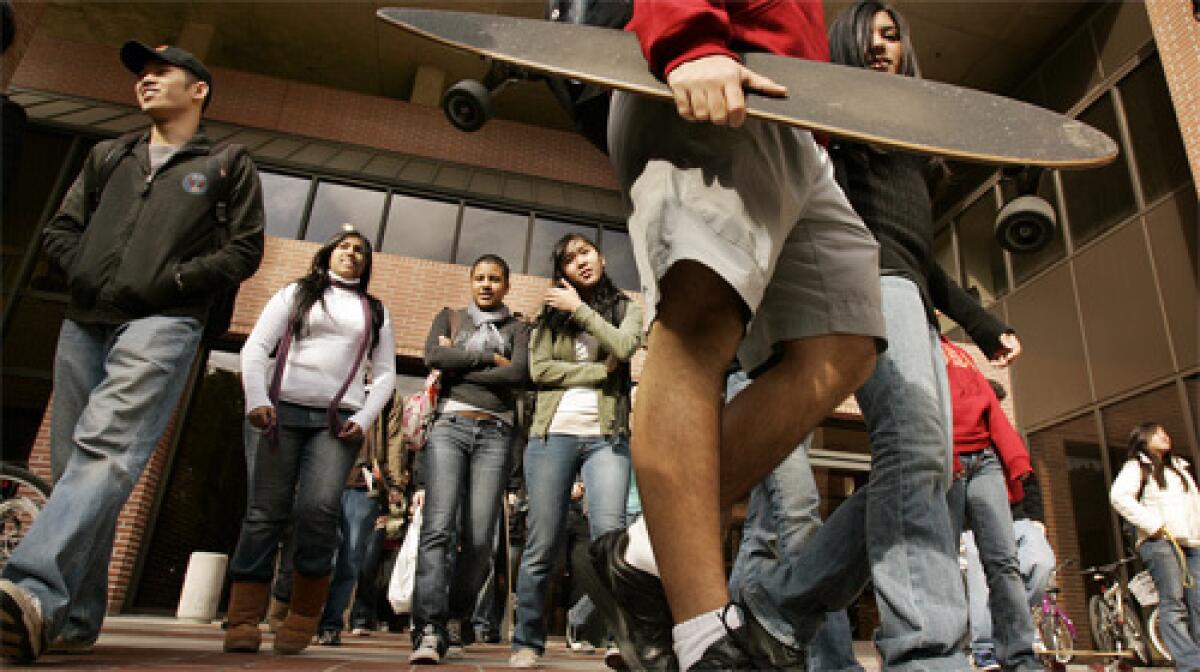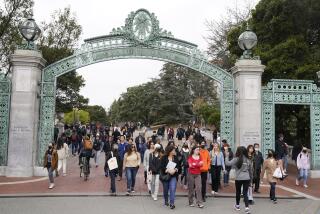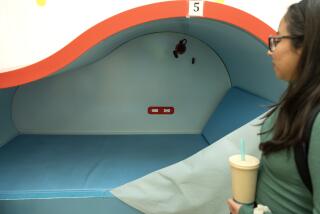College freshmen OK with parental watchdogs, survey finds

Campus administrators call them “helicopter parents” -- high-maintenance mothers and fathers who seem to hover over their children’s every step toward a college degree.
To faculty and staff, such parents are often viewed as a buzzing annoyance. Yet a surprising number of first-year college students are now reporting that they’re quite OK with their parents’ academic doting.
According to a UCLA survey released today, a whopping 84% of college freshmen nationwide reported that Mom and Dad showed the right amount of involvement in the decision to go to college. Of those, 80.5% said they were fine with the amount of input their parents offered in choosing a school.
“What we might have expected to see, given all the media attention about the helicopter parents, is that maybe a bunch of students would be saying there’s too much parental involvement,” said John Pryor, director of the annual freshman survey by UCLA’s Higher Education Research Institute.
Instead, only about 10% complained that their parents’ involvement in the application process was over the top.
The survey’s findings are contrasted sharply by the anecdotes of college administrators who, Pryor said, bemoan “the mother who calls up the chief of security to say that it’s cold out and can you make sure Susie is wearing her sweater.”
Academics complain that baby boomers -- known for independence during their own teen years -- keep their own children on fairly short leashes. Though they might have called home once a week from a dormitory pay phone in their college days, helicoptering boomers are keeping close tabs on their progeny via e-mail and cellphones.
Instead of inspiring resentment, many of the freshmen interviewed on local campuses Wednesday said they welcomed their folks’ frequent checking in.
USC freshman Charles Hu of San Jose said his parents insisted on talking via web-cam with him twice a week at the beginning of the school year, asking about his grades and nudging him toward a major in business.
“I think it’s fine; it’s not too bad. I can get away with not telling them stuff,” said Hu, 18, adding that his parents are less protective than when he was in his teens.
Elijah Scott, a Cal State L.A. freshman from Monterey, Calif., said he finds himself wanting his mother’s input more now that he is away from home and facing bigger decisions.
“I call her a lot, saying, ‘Mom, how do I do this?’ ” said Scott, 18. “Now that we have our own responsibilities, we appreciate their involvement more.”
Peace between generations extends to choosing college courses and activities.
Nearly three-quarters of the 272,036 freshmen at 356 four-year colleges and universities surveyed said their parents had the right amount of involvement in those areas, while fewer than a quarter said too little. Only 3.4% said their folks overly intruded on class selection.
Latino and Asian freshmen presented a somewhat different story, mainly because so many of them were among the first generation to attend college in the United States.
About 27% of Latinos and 23% of Asian/Pacific Islander freshmen reported “too little” parental involvement in college applications. About 32% of Latinos and 33% of Asian/Pacific students said their parents had too few dealings with college officials -- roughly double the national average for all ethnic groups.
Parents who never attended college know less about the system and are less able to help their children, say authors of “The American Freshman: National Norms for Fall 2007.” Also, such families may have children enrolled in large public high schools, where guidance counselors carry heavy case loads and youngsters are at risk of falling between the cracks, said Sylvia Hurtado, director of UCLA’s Higher Education Research Institute.
Hurtado urges colleges to reach out more “to students whose parents may not be as savvy about the process.”
Children of immigrants also say their parents are often too busy to help with the application process or involve themselves in the students’ lives at school. Cal State L.A. freshman Mary Cortez said her parents did not attend college before emigrating from Mexico 15 years ago and now work long hours running a restaurant.
“They pay for everything. I’m fine the way it is,” said Cortez, 19, of Pico Rivera. She turns for guidance to her older sister, who attends the same school.
Enrique Diaz, another Cal State L.A. freshman, said his father attended college in Mexico but doesn’t know the application system in California. “I’m used to doing work by myself,” said Diaz, 18, of Pasadena.
There are exceptions.
Trinidad Martinez, 18, of Glassell Park said the fact that her immigrant parents from Mexico did not attend college drove them to make sure she did. They went to every meeting available to learn about choosing colleges and filling out applications and pushed her to submit forms on time.
“They wanted to give me more opportunities, so I could choose a career,” said the Cal State L.A. nursing student.
The survey asked about students’ perceptions of parents’ activities but not whether Mom helped them write application essays or Dad accompanied them on campus tours.
The survey also found some unsettling trends in students’ reliance on the Internet. Nearly 76% of freshman reported frequent Internet use for research and homework but only 35% said they often verify that information with other sources, such as library books and experts.
In interviews, many students said they do so much Internet research because they don’t have to leave the comfort of their dorm room.
The Internet also allows them to e-mail references and articles when working on group projects.
“It’s pretty reliable,” said USC freshman Joayn Truong, 18, of Piedmont, Calif., who almost always opts for Google over library books.
More to Read
Start your day right
Sign up for Essential California for news, features and recommendations from the L.A. Times and beyond in your inbox six days a week.
You may occasionally receive promotional content from the Los Angeles Times.








